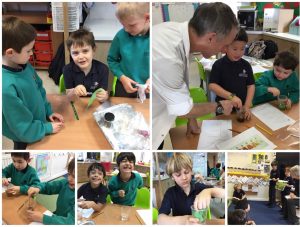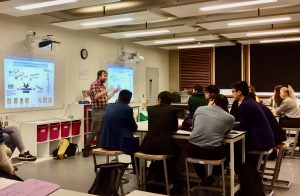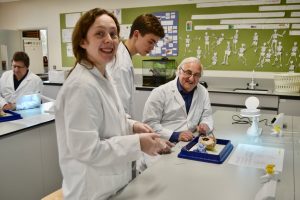Primary


- Everything in moderation: the Ogden Trust has produced a ‘How to’ guide for leading a primary science moderation meeting, together with moderation sheets for each year group which highlight the subject knowledge required and the necessary working scientifically skills that have to be evidenced.
- Resources from the Ogden Trust: a range of curriculum resources for teaching and learning, as well as ‘How to’ guides to help encourage and develop physics at your school.
- Science Talk: great ideas for encouraging curiosity about science for EYFS at school and at home.
The Abingdon Science Partnership are re-working some of the workshops that we run in our lab into an online format so that students, teachers, and families can do them wherever they are with minimal resources. They include a presentation, video demonstrations, and suggested activities, and are aimed at Key Stage 1 and 2. We hope you like them!
- Chemistry at home workshop, with lots of colourful activities, including magic milk, rainbow columns, chromatography, making an acid/alkali indicator out of red cabbage, and investigating chemical reactions:
- Levers, gears and pulleys workshops:
- Levers: https://youtu.be/XEvCoacsG_E
- Gears: https://youtu.be/6Z8dw2yFWak
- Pulleys: https://youtu.be/H5eF7R9s-co
- Skeletons workshop, with activities on bones, joints, dislocation and dissecting an owl pellet:
- Chemical Reactions workshop with activities to develop scientific enquiry skills and knowledge of particles and factors affecting rates of reaction. For Year 5 and 6 at school or at home:
- Part 1 https://bit.ly/ASPRates1
- Part 2 https://bit.ly/ASPRates2
- Acids and Alkalis: make your own red cabbage indicator to test a rainbow of household substances, and react vinegar with some of your red cabbage solution to inflate a balloon without using your breath! ASP is more than happy to loan any of the equipment if you need it, please contact us.
You can find all our workshop videos on the Abingdon Science Partnership’s YouTube playlist.
- Slippery Surfaces: investigating friction
- Happy Landings: investigating air resistance
- Presentation
- Lesson Plan
- Pupil Worksheet
- Cone Template
- NASA’s Touchdown Challenge: design and build a shock-absorbing system that will protect two “astronauts” when they land. Also online here.
- Rainbow Collectors: investigating colour
- Crystal Creations: investigating crystals and easy ways to make them
- Practical Action: for lots of resources that focus on global issues including climate change, energy, food security and the Sustainable Development Goals.
- Paper helicopters: your task is to build and test several paper helicopters to investigate how changing the design affects the time it takes to fall to the ground.
- Shadow sticks and sundials: these experiments investigate how the shadow cast by the Sun can be used to measure time.
- Lava lamps: make your own lava lamp and investigate the chemistry behind how it works.
- Red cabbage indicator recipe: a very clear video clip by a master chemistry teacher showing how to make a simple acid/alkali indicator at home.
- Making a Cartesian diver to investigate buoyancy a simple and fun home made physics toy
- Observing the Sun: construct simple apparatus that can be used to view the surface of the Sun and to track the movement of sunspots across the surface.
- Pinhole cameras: construct a simple pinhole camera and use it to form images.
- Fluid flow: compare the viscosity of several different liquids by racing them against one another and make a non-Newtonian liquid.
- Antarctic penguins: this excellent site tells you all you want to know about penguins AND has a handy penguin size chart – draw and colour your own life-sized penguin cut outs and stick them to your walls!
- NASA’s Touchdown Challenge: design and build a shock-absorbing system that will protect two “astronauts” when they land. Also online here.
- Ice sheet melting and sea level rise: make a model to demonstrate how melting caps cause sea level rise. ASP Co-ordinator Jeremy Thomas shows you how in this series of videos. If you make a model, send us your photos for our Amazing Examples gallery by contacting us.
- Soils and vegetables: a very clear and well presented set of lesson plans on soil types and vegetable growing for some outdoor learning.
- Just Add Imagination: home activities for 7-11 year olds inspired by 8 people who’ve used science and maths as a springboard to creative and rewarding careers.
- Maddie Moate’s YouTube channel (with guest appearances from Greg Foot): Maddie Moate, CBBC Presenter, is now Live Streaming YouTube every weekday at 11am with a different theme each week e.g. Garden Week; Brilliant Bodies Week – all previous programmes available to view (30mins).
- NitroJen and the Amazing Technicolour Labcoat: a YouTube channel by Bright Sparks Science for simple science experiments to do at home.
- CREST Awards: challenging and thought-provoking real-world STEM projects for young people of all ages developed by the British Science Association. There are a range of award levels from the CREST Star award for 5-7 year olds to CREST Gold for 16+ year olds, and there are lots of project ideas perfect for doing at home! Take a look at the Abingdon Science Partnership’s easy guide to CREST Awards for 5-14 year olds.
- Conservation Optimism kids’ corner: posters to inspire conservation-themed creative activities. Conservation Optimism is a global community dedicated to sharing stories and resources to empower people from all backgrounds to make a positive impact for wildlife and nature.
- Your Plan, Your Planet: simple tips from Google, the California Academy of Sciences, and the Ellen MacArthur Foundation to help people and the planet thrive together.
- STEM Learning: a collection of resources and teaching materials approved by the National STEM Learning Centre, including resources for home learning, family activities to do at home, and activities to support continuing in-school delivery.
- Hands on Universe – KS1: colourful fact sheets and activity suggestions on space topics for Key Stage 1 from the UK Science and Technology Facilities Council.
- Hands on Universe – KS2: colourful fact sheets and activity suggestions on space topics for Key Stage 2 from the UK Science and Technology Facilities Council.
- Antarctic penguins: this excellent site tells you all you want to know about penguins AND has a handy penguin size chart – draw and colour your own life-sized penguin cut outs and stick them to your walls!
- Encounter Edu: live and archived videos of scientific expeditions with supporting materials for teaching and learning.
- Canterbury Primary Science Partnership resources: a fantastic list of suggested activities for Science, Maths and DT.
- Fantasy Jurassic Park at Home: make your own model Jurassic landscape!
- Ri Off the Shelf Masterclasses: resources to engage and challenge the mathematically able at KS2 but with a strong science crossover, as used in ASP’s own annual series of Ri Maths Masterclasses with local primary schools.

Secondary
For collections of more general online resources that are suitable for secondary students of all ages, check out these links:
- STEM Learning: a collection of resources and teaching materials approved by the National STEM Learning Centre, including resources for home learning, family activities to do at home, and activities to support continuing in-school delivery.
- Encounter Edu: live and archived videos of scientific expeditions with supporting materials for teaching and learning.
- Oxford Sparks: an amazing website that allows secondary students to explore the research being conducted at the University of Oxford through animated videos (accompanied by resources for teachers), podcasts, and ‘Meet the Scientist’ blogs covering a whole range of topics, such as sports science, neuroscience, computer science and more!
- Tracker is a freely downloadable software package allowing you to track motion in video clips, plot graphs and calculate many, motion related parameters. Here is an introductory video tutorial by Abingdon Science Partnership Co-ordinator and Physics Teacher, Jeremy Thomas: Tracker Software Tutorial
For more specific resources, check out the sections below for Key Stage 3, Key Stage 4, and A Level students.
Key Stage 3
- CREST Awards: challenging and thought-provoking real-world STEM projects for young people of all ages developed by the British Science Association.
- Discovery Award: students work to solve a STEM challenge, or challenges, with minimal adult intervention and then present their work. Take a look at ready-made Discovery Award plans and the Discovery getting started guide from the British Science Association’s resource library. Abingdon Science Partnership’s favourite Discovery projects come from the huge and well-resourced ideas provided by one of our favourite, partner organisations Practical Action – we highly recommend Beat the Flood; Stop the Spread; Squashed Tomato Challenge; Wind Power Challenge and Ditch the Dirt but there are plenty to choose from.
- Sign up for free, log in and download a CREST Discovery Award Passport
- Research, design, carry out and test a project lasting about 5-6 hours in total
- Take some photos, write a report, make a presentation to family and fill in all the sections in the Discovery Passport (team work can be working with others in the family or online or e-mailing others for help or advice)
- Upload a scanned copy of your Discovery Passport via the CREST portal, pay a small fee and wait for your certificate to arrive!
- Bronze Award: introduce students to project work empowering them to work like real scientists, technologists, engineers or mathematicians. Students choose their own topic and methodologies, giving them complete freedom over their work. Take a look at some project ideas from the resource library.
- Discovery Award: students work to solve a STEM challenge, or challenges, with minimal adult intervention and then present their work. Take a look at ready-made Discovery Award plans and the Discovery getting started guide from the British Science Association’s resource library. Abingdon Science Partnership’s favourite Discovery projects come from the huge and well-resourced ideas provided by one of our favourite, partner organisations Practical Action – we highly recommend Beat the Flood; Stop the Spread; Squashed Tomato Challenge; Wind Power Challenge and Ditch the Dirt but there are plenty to choose from.
- Physics at home: a list of resource links recommended by the Institute of Physics Education team organised by topic.
Key Stage 4
Physics
- Momentum: a set of four stretch and challenge lessons for separate scientists with suggested home experiments for any GCSE Physics Momentum Topic (each lesson approximately 45mins):
- Lesson 1 Introduction to Momentum
- Lesson 2 The Law of Conservation of Momentum
- Lesson 3 Rate of Change of Momentum
- Lesson 4 Momentum, impacts and safety
- VIDEO CLIPS TO DOWNLOAD FOR LESSONS 1 and 3:
- PhET: a well-designed and comprehensive set of online simulations and experiments covering Biology, Chemistry, Physics, Earth Science and Maths.
- GCSE Physics online: hundreds of free YouTube tutorials, organised by exam board and topic, explaining physics in an easy and interesting way and presented by the famous LEGO Physics Guy, Lewis Matheson (for a small subscription you can access even more videos, revision materials and downloads).
- Isaac Physics: free sign up to hundreds of online physics questions with instant, online assessment and with multi-level ‘HINT’ tabs offering structured help to solve problems, including videoed model answers.
- Check here for advice and training on how to use their online problems and tutorials remotely.
- Physics at home: a list of resource links recommended by the Institute of Physics Education team organised by topic.
A Level
- PhET: a well-designed and comprehensive set of online simulations and experiments covering Biology, Chemistry, Physics, Earth Science and Maths.
- A Level Physics online: hundreds of free YouTube tutorials, organised by exam board and topic, explaining physics in an easy and interesting way and presented by the famous LEGO Physics Guy, Lewis Matheson (for a small subscription you can access even more videos, revision materials and downloads).
- Isaac Physics: free sign up to hundreds of online physics questions with instant, online assessment and with multi-level ‘HINT’ tabs offering structured help to solve problems, including videoed model answers.
- Check here for advice and training on how to use their online problems and tutorials remotely.
- Evidence-Based Medicine for under 18s: lesson plans and resources for teachers that emphasise opportunities to teach critical thinking using health claims. For example, students can investigate the claim that drinking cola can help students concentrate.

All Ages
- Zooniverse: participate in research of all kinds, from classifying galaxies to counting penguins to transcribing manuscripts. Whatever your interest, there’s a Zooniverse project for you.
- COVID-19 Open Research Dataset Challenge (CORD-19): a compilation of scientific papers and data about COVID-19 and related coronaviruses. Anyone can download the data and have a go at doing some analysis or literature review projects, for example, for Extended Project Qualifications (EPQs) or personal interest.
- ATLAScraft: a map of CERN and the ATLAS detector created in the popular game Minecraft. Anyone owning the PC/MAC version of the game Minecraft will be able to download and visit the virtual world for free.
- ATLAS in Minecraft Tour: a well narrated introduction to the ATLAScraft model, how to use it and a quick tour with Dr Sam Henry, Particle Detector Physicist at the University of Oxford.
- Stellarium: an excellent, free to download, planetarium package. It runs on various platforms and allows you to find your way around the night sky in real time, the past and the future. We hope to post some simple Stellarium tutorials before too long.
- Antarctic penguins: this excellent site tells you all you want to know about penguins AND has a handy penguin size chart – draw and colour your own life-sized penguin cut outs and stick them to your walls!
- Jurassic coast online quiz
- Interactive 3D visualisation of the International Space Station: if the skies are clear this site will help you to predict and spot bright satellite passes over where you live, including the International Space Station.

